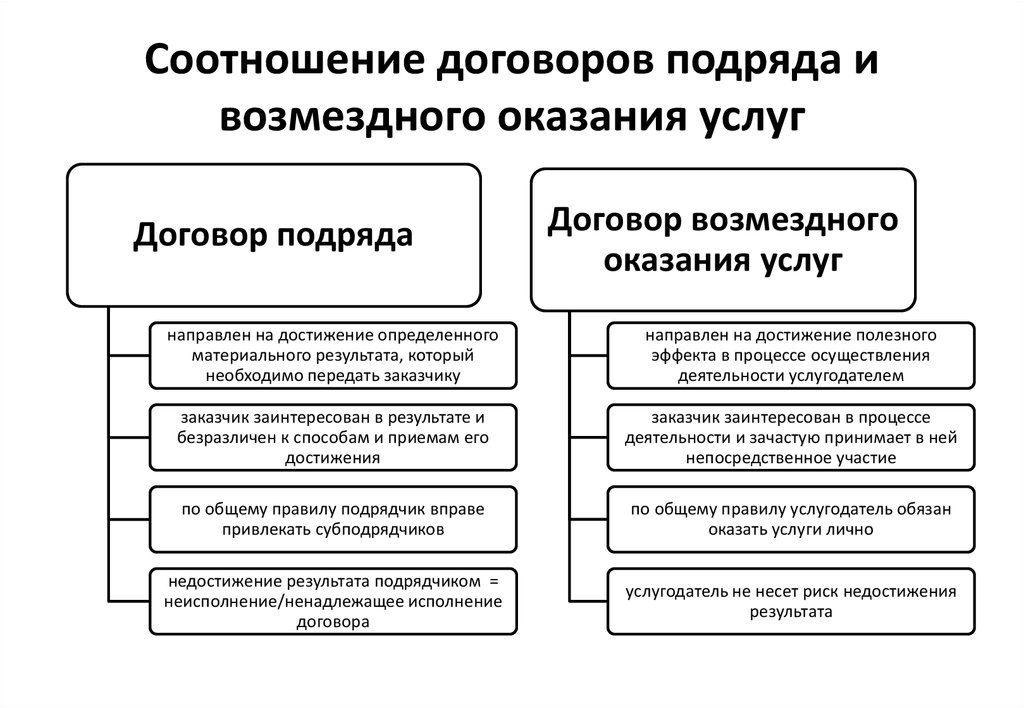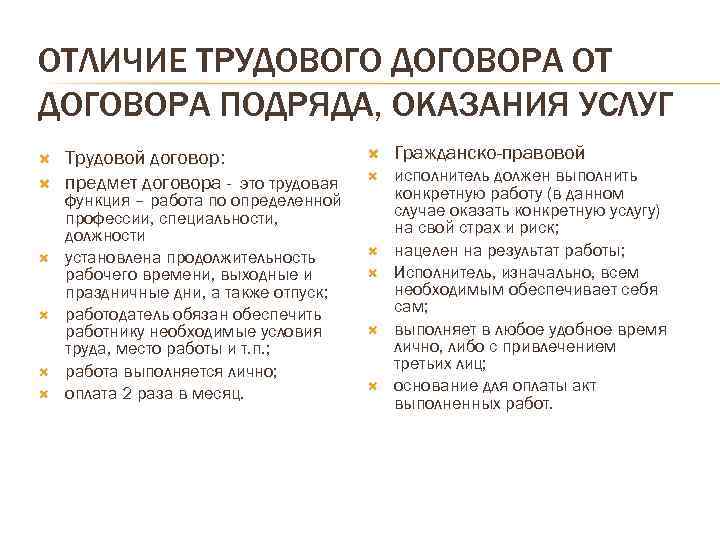Both a legal entity and an individual entrepreneur, carry out work and provide services under the relevant agreements. Work and services are recognized as interrelated objects in civil law. But, despite similar legal aspects, they are regulated by different rules. In the article, we consider what the main differences are between a contract and a service contract.

Discussions
Various works are carried out on the basis of a contract, and services - on the basis of a contract for the provision of services. Interestingly, at present, discussions about the concept of “work” and “services” do not stop. They even advocate to be regulated equally. Theoretical disputes give rise to confusion in practice. To better understand the differences between a contract and a service agreement, we will analyze it separately. So what are they like?
Service
The basic rules are contained in articles 779-783 of chapter 39 of the Civil Code. According to the provisions of these articles, the contractor must provide services to the customer in the form of a specific activity or specific actions. The customer, in turn, is required to pay for these services.
The subject of the contract can be medical or preventive measures, financial and legal analysis of the company, tourist services and so on. Separate rules on the form of this agreement are not provided by law. Mostly transactions are made in the usual written form. But in some cases notarization is required. These include, for example, transactions between legal entities or those where one of the parties is an individual. The contract is concluded when an agreement is reached on all conditions. Moreover, non-compliance with the written form makes it impossible to confirm the transaction in the event of a dispute.
The parties are the customer and the contractor. If customers can be both individuals and legal entities, then the executors must be duly registered with the tax service and be legal entities or individual entrepreneurs. To carry out certain types of activities, an additional license or other permits may be required.
Services are provided on the instructions of the customer. There are no special requirements in this case by law. However, in practice, the contract does not spell out specific tasks. But they can be made out in the form of the application.

Contract
Let's move on to the next document. Having studied the main provisions of the contract for the provision of services, in the contract the differences become apparent. Find out what are the features of this concept. By it is meant the carrying out of the corresponding work in the process of which some thing is created or processed. In the future, it will become the property of the customer.
If you do not consider the work of state and municipal services, the Civil Code of the Russian Federation provides for three types of relevant agreements. These include in a row:
- Domestic. In this case, the contractor must perform certain work. Basically, they relate to repairs and small-scale construction (painting walls, installing parquet, roof repairs, etc.).
- Building. The contract is for more serious work. In accordance with it, the customer must provide the necessary conditions, and after completion of construction - accept the work and make the payment.
- To carry out design and survey work.In accordance with the contract, the contractor must draw up technical documentation or carry out surveys, and the customer must accept and pay for the work. As examples, textual and graphic materials can be used to determine the design and architecture features for subsequent construction; ennoblement of allotments of land and more.

Similarities
Before identifying the difference between a contract and a service agreement, we highlight similar features, in particular:
- Retribution.
- Consensual in nature.
- Obligations on both sides.
Work and Services
The basic concepts in both contracts are “services” and “work”. Article 128 of the Civil Code of the Russian Federation states that they are objects of civil rights. These are interconnected concepts both in theory and in practice. Article 783 of the Civil Code of the Russian Federation says that all the provisions on the contract are also used in the provision of services. In the event that this does not contradict the norms provided for the contract for the provision of services for compensation (Articles 779-782 of the Civil Code of the Russian Federation).
However, due to the fact that the difference between a contract and a contract for the provision of services in relation to their facilities is not specified in the Civil Code, different interpretations appear that are used not only by theorists, but also judges when making decisions.
Tangible and intangible
Although the concepts of “services” and “work” are not disclosed or distinguished in the Civil Code of the Russian Federation, they are available in the Tax Code. According to paragraph 4 of Article 38 of the Tax Code of the Russian Federation, work is understood to mean activities whose results are expressed in a material nature and are implemented to meet the needs of legal entities or individuals. In paragraph 5 of this article, the concept of service is also given. This is an activity whose results are not expressed materially, but are consumed in the process itself. It seems that this is the main difference between the contract for the provision of services from the contract.

Examples
The above difference may seem simple. However, in practice, many questions arise. So, the result of the provision of services can also be a thing that can be touched, for example, a lawsuit prepared by a lawyer, a diploma of higher education and other cases. Despite the material nature of the result, all judges recognize such contracts as the provision of services.
For example, the trial court No. F04-425 / 2009 (20193-A45-39) found that the contract in question could not be recognized as a contract. Its essence was as follows. The appraiser had to assess the property on time for a certain amount of remuneration. After that, he undertook to provide an act of acceptance of work. The court explained its decision by the fact that the subject was the assessment, and not its result. Therefore, the contract was recognized for the provision of services.
A question may arise regarding contracts under which the contractor is required to perform certain actions. And if at the same time concrete results are achieved, then pay more money than the amount that was originally provided. In this regard, you can consider a contract for the provision of medical services. It may provide for both treatment and cure. The second case includes the first. However, treatment does not always bring the appropriate result.
Recovery makes the agreement a regular service contract. In this case, a double amount may be written in it. Then the smaller one is in action, and the double is paid when a positive result is achieved. If only the “effect” is prescribed in the terms of the contract, then you should use paragraph 3 of Article 424 of the Civil Code of the Russian Federation, according to which the calculations are carried out at ordinary prices.

Essential conditions and denial
The difference between a contract and a service agreement is in the essential conditions. In the latter case, the actions performed by the contractor or the corresponding activity are necessarily listed. If this is not foreseen, then the agreement will not be valid.When contracting, in addition to the subject, the deadlines must be indicated.
The law provides for the possibility of canceling the contract in established cases with mandatory compensation for losses. So, in a contract for the provision of services, the customer must pay the expenses that were actually incurred by him. This provision is provided for by paragraph 1 of Article 782 of the Civil Code. However, if the customer refuses the contract, he will have to pay the cost of the proportional part of the work that was done before the contractor received the corresponding notice. It is also necessary to compensate for the loss due to termination of the contract. This is stated in article 717 of the Civil Code.
Payment and risks
The difference between a contract and a service agreement is also visible at other times. In the first case, payment is made after completion of work and delivery of its results to the customer with proper execution. Also, the customer may agree to early payment, even if it is not provided for by the contract. However, in the second case, the customer pays for the services strictly in accordance with the terms and in the manner specified in the contract.
From the point of view of tax legislation, the following should be noted. In the case of the contract, taxpayers-performers distribute their expenses to the rest of the production, which has not been completed. But when providing services, performers can indicate the amount of direct costs incurred to reduce production income without distribution to the balance of production that has not been completed.
Table. Key Features
If you couldn’t remember what the differences between the contract and the provision of services are, the table will help to remember the main nuances. It can be saved, which, if possible, can be used.

Employment contract and contract
These two types of transactions also have similar features. But we can also note the differences between labor contracts and work contracts. Due to a lack of understanding of the nuances of these agreements, conflicts may arise in the future. Therefore, it is necessary to distinguish between two concepts. This is easy to do by considering the scope of the regulation, the nature of the legal relationship, the deadline for the work, payment, performers, and rest time. Let us express the difference between an employment contract and a contract in the table of differences:

Conclusion
As you can see, there are many points that connect both concepts. Others show how the contract differs from the provision of services. We learned from the article that many of the rules that are applicable to the first concept can also be used in the provision of services for a fee.
It is important to understand that the proper qualification of the relevant legal relations is of great importance, as it provides for different consequences for the parties. Therefore, when drawing up and signing such agreements, the considered differences should be taken into account.
What do you think about this issue? Do you have your own experience that confirms or, on the contrary, refutes the similarities and differences indicated in the article? Do you adhere to the point of view that work and services should be regulated equally or do you think that these concepts should be further considered separately? Share your thoughts with other readers in the comments.
